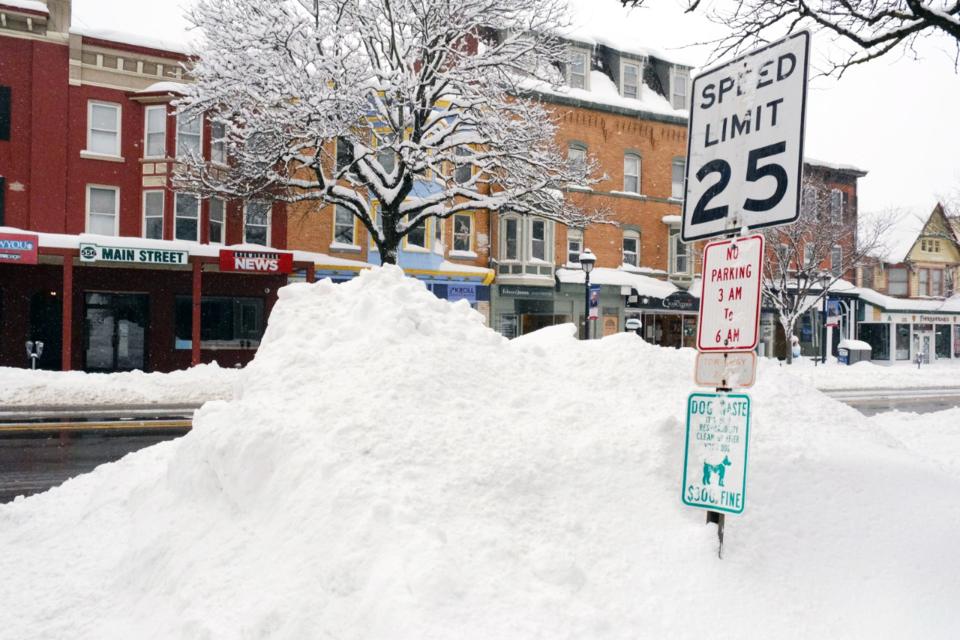Winter is coming... to the Poconos. Be ready for it | Something to Think About
If you have been enjoying this great fall weather, you’re not alone! The warmer temps and sunny days, lots of color on the trees signals the soon-to-be colder wintery weather to come.
For me, certainly I could take the true winter weather for the week of the holidays then poof, right back to late spring and summer. Alas, that is only my wish, there are many who are just waiting for the cold and white stuff to enjoy winter sports and cozy fires with hot chocolate or toddies take your choice!
However, there are preparations that should be made before the weather changes and you or I may be caught off guard. These tips are “old hat” to some, but for others, either a good refresher or added to a new “to do” list.
Since disaster can strike without warning (or an off-weather prediction), knowing what to do ahead of time and being ready is the key to getting to the other side safely and with the least disruption. For those who may have just joined our community, there are differences between a metropolitan area and our rural one that you should be prepared for. One is that often when there are storms electric can be lost for anytime from hours to days, or as in the case of Hurricane Sandy a few years ago, weeks.

Climate change in the Poconos:Heavy rains could become more frequent over time in northeast PA
News you can use:How to run your generator safely during a power outage
Here are some tips that new residents should know (and current residents, just brush up on these). Practice energy conservation, there may be rolling blackouts. Always keep your car’s gas tank at least half-full. This may become your charging station for your cell phone. And remember gas station pumps use electricity.
Surge protectors are your friend. Computers or other electronic equipment can be saved just by taking this step. If the power goes out, check your circuit breaker (or older homes fuse box) to make sure nothing has blown. Check with a neighbor to see if they are experiencing the same.
Turn off your computers, televisions, stereos and any other appliances your were using before he power went off. Especially important if there is no power surge protector. Leave at least one light on so you know when the power is back on. Today there are also lights that can store power so that when there is an outage, those bulbs will automatically stay on for several hours.
Like you always say to the kids, don’t open the refrigerator door is there is no need. Preserve the cold. If there is warning of possible outages, frozen water bottles kept in the refrigerator and freezer will help keep things cool longer.
IF YOU ARE USING A GENERATOR, AND THIS IS VERY IMPORTANT, OPERATE IT OUTSIDE YOUR HOUSE AND AWAY FROM THE BUILDING. DO NOT USE IT IN THE BASEMENT, GARAGE, OR ANYWHERE INSIDE THE HOUSE. This is a message that cannot be more forcefully said. Any other place, aside from outdoors and away from windows or doors can and will result in possible death.
Last week's 'Something to Think About':Pocono families should plan ahead for fire safety
Do not hook a generator up direction to your home’s wiring. Instead, connect the equipment and appliances your want to power directly to the outlets on the generator. Those lucky enough to have whole house generators in place, make certain yours has been serviced and is ready for storm season. Likewise, have your home’s heating system checked before it is in full swing and if you have a fireplace, chimney cleaning should be on the list as well.
With the electric issue aside, the remaining items of necessity are usually clear.
Water, stored in bottles, with at least one gallon per person per day (3 days-worth is the usual suggestion). Change out water every six months is the recommendation. Obviously food, remember that non-perishable food that can stay for a longer period of time is usually best. Of course, there is always the rush for bread, milk and eggs at the grocery story.
If you have small children, infants diapers and wipes (and wipes for older folks too) and formula are something you will need to make certain are on hand. And take a look at any medications that may need to be on the ready, enough for at least a week’s worth in advance.

There are the other items like batteries, flashlights, power packs for phones, first aid items, cleaning items like paper towels, trash bags, paper plates and other disposable items that should be reviewed too. 911 can usually track your cell to a specific area, but make sure you know where you are and have good directions in case of an emergency.
Downed trees are always possible so knowing a second route to and from your home will be necessary if you need to evacuate or must call 911. If you go to a public shelter. Reminder, no alcoholic beverages, weapons and perhaps pets may not be allowed.
It’s a lot to think about, but early preparation and reviewing with your family all the needs will get you prepared. And what is it they say, “If I’m prepared, probably won’t need to use it!”
Debbie Kulick writes a weekly column for the Pocono Record and Tri-County Independent. She serves on the frontlines of the COVID-19 pandemic as an EMT.
This article originally appeared on Pocono Record: Never too early to prepare for a Poconos winter

